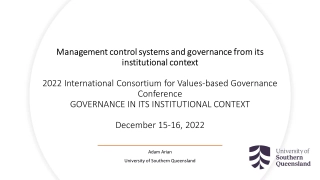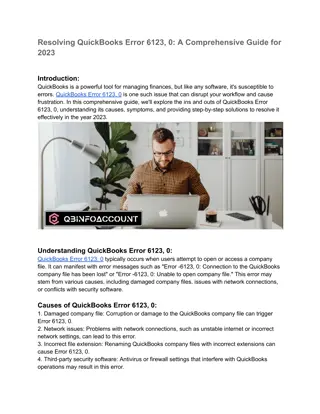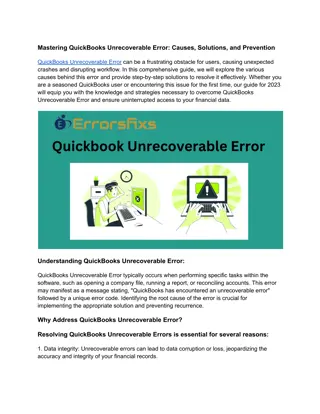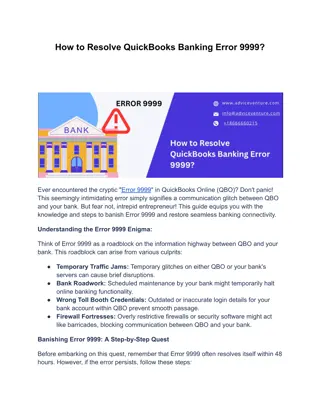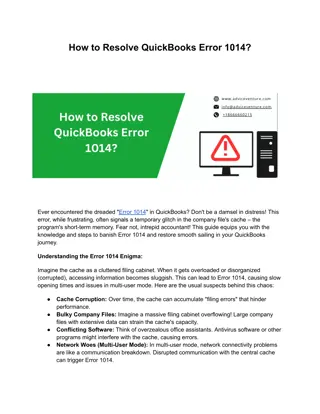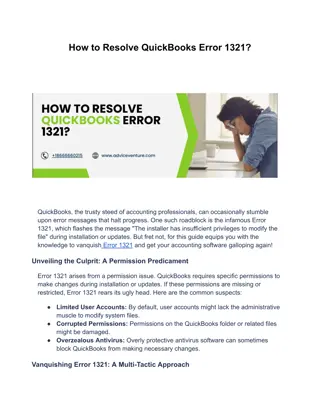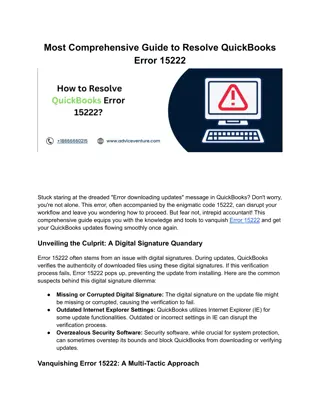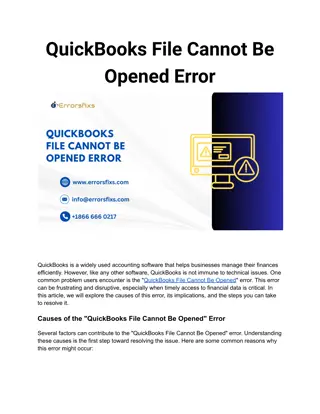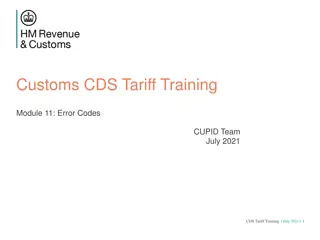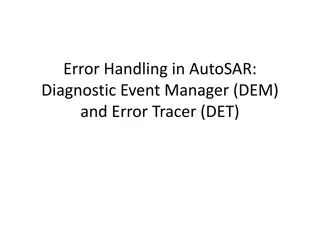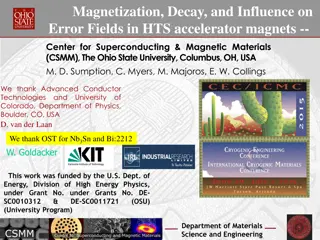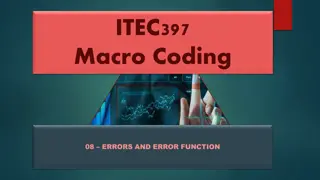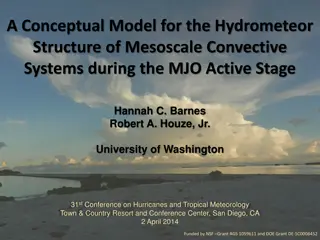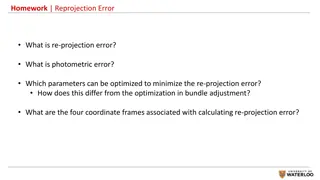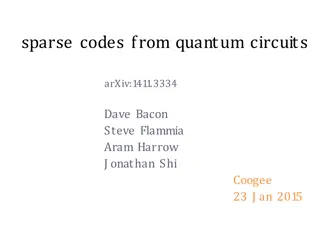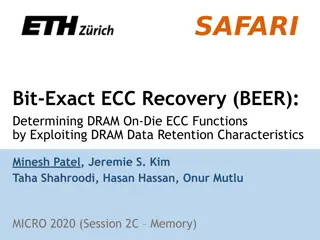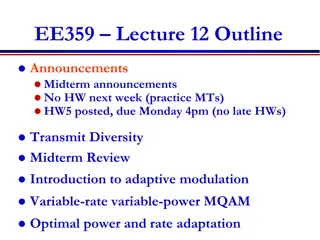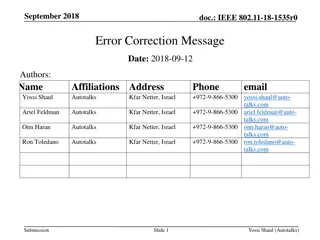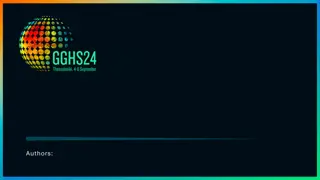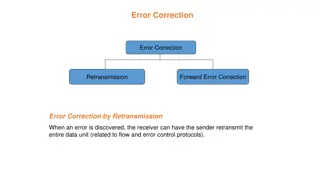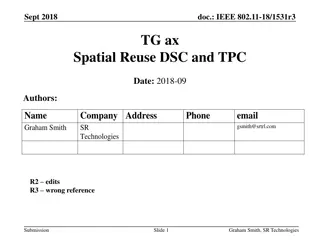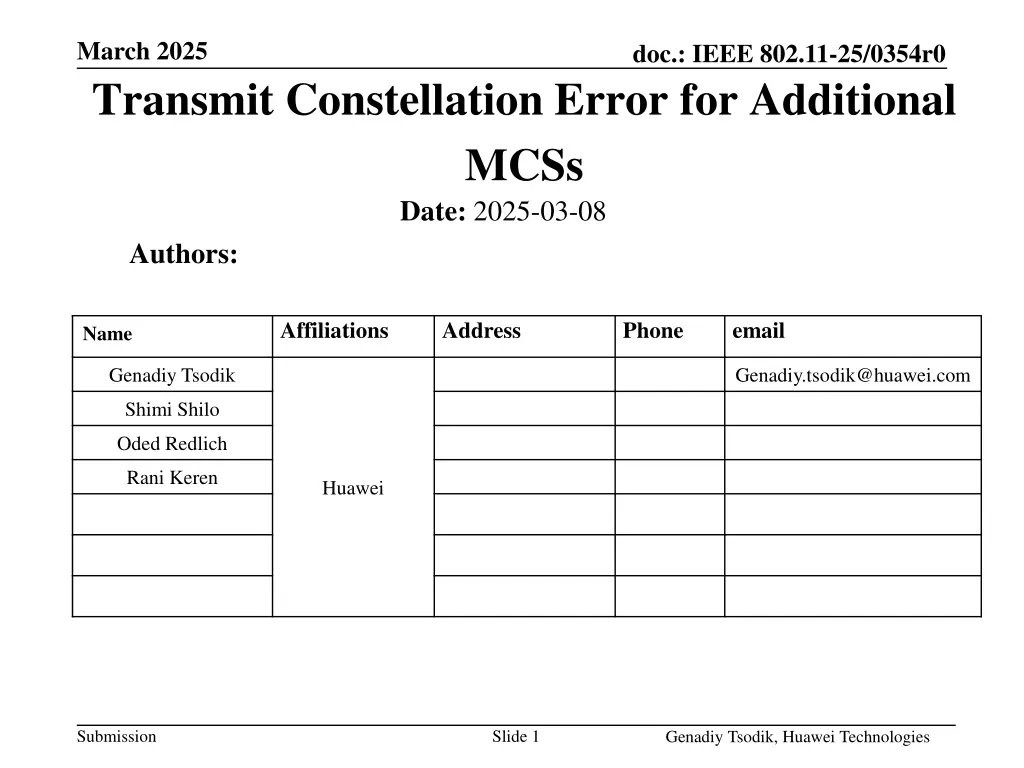
March 2025 Transmit Constellation Error Analysis
Explore the analysis and proposal of new MCS values for improving throughput in single stream transmissions in March 2025. The document discusses the transmit constellation error requirements for additional MCSs under the IEEE 802.11 standard, highlighting sensitivity degradation and proposed error values.
Download Presentation

Please find below an Image/Link to download the presentation.
The content on the website is provided AS IS for your information and personal use only. It may not be sold, licensed, or shared on other websites without obtaining consent from the author. If you encounter any issues during the download, it is possible that the publisher has removed the file from their server.
You are allowed to download the files provided on this website for personal or commercial use, subject to the condition that they are used lawfully. All files are the property of their respective owners.
The content on the website is provided AS IS for your information and personal use only. It may not be sold, licensed, or shared on other websites without obtaining consent from the author.
E N D
Presentation Transcript
March 2025 Transmit Constellation Error for Additional MCSs Date: 2025-03-08 Authors: doc.: IEEE 802.11-25/0354r0 Affiliations Address Phone email Name Genadiy Tsodik Genadiy.tsodik@huawei.com Shimi Shilo Oded Redlich Rani Keren Huawei Submission Slide 1 Genadiy Tsodik, Huawei Technologies
March 2025 doc.: IEEE 802.11-25/0354r0 Introduction 802.11bn defined four new MCS values to improve the throughput of single stream transmissions We need to define all the relevant specification parameters for the new MCSs In this contribution we present an analysis of the corresponding transmit constellation error and propose new values to be added to the 802.11bn spec Submission Slide 2 Genadiy Tsodik, Huawei Technologies
March 2025 doc.: IEEE 802.11-25/0354r0 Candidate Transmit Constellation Error Transmit Constellation Error is defined in 802.11be in Table 36-65 Allowed relative constellation error versus constellation size and coding rate We assume that the allowed constellation error of each new MCS is expected to be within the range of the constellation errors of MCSs corresponding to two closest PHY bit rates (next higher and lower) Submission Slide 3 Genadiy Tsodik, Huawei Technologies
March 2025 doc.: IEEE 802.11-25/0354r0 Analysis Principle and Criteria We checked the sensitivity level degradation caused by the transmit constellation error at the existing MCS We can see that both for QPSK and 16QAM Tx EVM defined by spec leads to ~1dB degradation @10% PER 1.1dB 1dB Thus in order to define the requirements for new MCSs we performed the next steps: Check sensitivity level of SISO transmission of the new MCS in TGnD channel with no impairments Check sensitivity degradation with transmit constellation error within the range [TxEVM0, TxEVM1], where TxEVM0 and TxEVM1 are the requirements for MCSs corresponding to lower and higher bit rate compared to tested MCS, respectively (Tx EVM is created using the Rapp PA model) Select transmit constellation error that leads to sensitivity degradation lower than or equal to 1dB In the next slides we present simulation results and propose transmit constellation error requirements for all new MCSs Slide 4 Submission Genadiy Tsodik, Huawei Technologies
March 2025 doc.: IEEE 802.11-25/0354r0 QPSK 2/3 Current Transmit Constellation Error for QPSK and QPSK are -10dB and -13dB, respectively Transmit Constellation Error of -11dB and -12dB imply similar degradation of ~0.9dB @10% PER Submission Slide 5 Genadiy Tsodik, Huawei Technologies
March 2025 doc.: IEEE 802.11-25/0354r0 16QAM 2/3 Current Transmit Constellation Error for 16QAM and 16QAM are -16dB and -19dB respectively Transmit Constellation Error of -18dB and -19dB imply degradation of ~0.9-1dB @10% PER, while worse Tx EVM leads to degradation of more than 1dB Submission Slide 6 Genadiy Tsodik, Huawei Technologies
March 2025 doc.: IEEE 802.11-25/0354r0 16QAM 5/6 Current Constellation Error for 16QAM and 64QAM 2/3 are -19dB and - 22dB respectively Transmit Constellation Error of -21dB and -22dB imply degradation of ~0.5dB @10% PER, while Tx EVM of -20dB leads to degradation of ~0.7dB Submission Slide 7 Genadiy Tsodik, Huawei Technologies
March 2025 doc.: IEEE 802.11-25/0354r0 256QAM 2/3 Current Transmit Constellation Error for 64QAM 5/6 and 256QAM are -27dB and -30dB respectively Transmit Constellation Error of -29dB and -30dB imply degradation of ~0.9-1.1dB @10% PER, while worse Tx EVM leads to degradation of ~1.4dB Submission Slide 8 Genadiy Tsodik, Huawei Technologies
March 2025 doc.: IEEE 802.11-25/0354r0 Performance in AWGN channel We checked the performance of new MCSs with Tx EVM values within the range of two closest PHY bit rates The tested scenario was AWGN channel and 4096B payload size as defined in the spec In case of QPSK 2/3 Tx EVM of -12dB provides slightly better performance compared to Tx EVM of -11dB Submission Slide 9 Genadiy Tsodik, Huawei Technologies
March 2025 doc.: IEEE 802.11-25/0354r0 Performance in AWGN channel In case of 16QAM 2/3 Tx EVM of -18dB provides a gain of 0.3dB compared to Tx EVM of -17dB Submission Slide 10 Genadiy Tsodik, Huawei Technologies
March 2025 doc.: IEEE 802.11-25/0354r0 Performance in AWGN channel In case of 16QAM 5/6 and 256QAM 2/3 better Tx EVM provides a very small performance gain of ~0.1dB Submission Slide 11 Genadiy Tsodik, Huawei Technologies
March 2025 doc.: IEEE 802.11-25/0354r0 Phase Noise Impact We added a transmit phase noise as defined in WLAN performance criteria document to check the impact on the performance As we see on the figure below, phase noise cause negligible degradation compared to Tx EVM caused by PA nonlinearity Submission Slide 12 Genadiy Tsodik, Huawei Technologies
March 2025 doc.: IEEE 802.11-25/0354r0 Summary We studied the transmit constellation error requirements for the new MCSs incorporated in 802.11bn Based on the simulation results (with AWGN and TGnD channels) we propose to define the next transmit constellation error values for the UHR MU PPDU (will be added to the Allowed relative constellation error versus constellation size and coding rate table in 802.11bn) Same results are shown in [1] MCS QPSK 2/3 16QAM 2/3 16QAM 5/6 256QAM 2/3 Transmit Constellation Error -12dB -18dB -20dB -29dB Submission Slide 13 Genadiy Tsodik, Huawei Technologies
March 2025 doc.: IEEE 802.11-25/0354r0 References [1] 11-25/392r0 Transmit and Receive Specifications for New MCS in 11bn, Alice Chen, et. Al (Qualcomm) Submission Slide 14 Genadiy Tsodik, Huawei Technologies
March 2025 doc.: IEEE 802.11-25/0354r0 Straw Poll #1 Do you support the following: Transmit Constellation Error required values for the new MCSs 17, 19, 20 and 23 (QPSK 2/3, 16QAM 2/3, 16QAM 5/6 and 256QAM 2/3) for the UHR MU PPDU will be: MCS QPSK 2/3 16QAM 2/3 16QAM 5/6 256QAM 2/3 Transmit Constellation Error -12dB -18dB -20dB -29dB Supporting docs: 11-25/354r0, 11-25/392r0 Submission Slide 15 Genadiy Tsodik, Huawei Technologies

